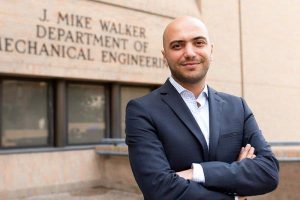LCSR Seminar Farshid Alambeigi,”Surgineering Using Intelligent and Flexible Robotic Systems”
3400 N Charles St
Recent technological advances in the field of surgical Robotics have resulted in the development of a range of
new techniques and technologies that have reduced patient trauma, shortened hospitalization, and improved
diagnostic accuracy and therapeutic outcome. Despite the many appreciated benefits of robot-assisted mini-
mally invasive surgery (MIS), there are still significant drawbacks associated with these technologies including, dexterity, intelligence, and autonomy of the developed robotic devices and prognosis design of medical devices and implants.
The dexterity limitation is associated with the poor accessibility to the areas of interest and insufficient
instrument control and ergonomics caused by rigidity of the conventional instruments and implants. In other words, the ability to adequately access different target anatomy is still the main challenge of MIS end endoscopic procedures demanding specialized instrumentation, sensing and control paradigms.
To enhance the safety of robot-assisted procedures, current robotics research is also exploring new ways of providing synergistic intelligent semi/autonomous control between the surgeon and the robot. In this context, the robot can perform certain surgical tasks autonomously under the supervision of the surgeon. However, such autonomy not only requires understanding the robot’s perception and adaptation to dynamically changing environments of the tissue, but also it requires understanding the mental workload and decision-making state of the surgeon as the decision-maker and key component of this systems. This demands a Surgeon-Centric Brain-In-the-Loop Autonomous Control techniques.
To address these challenges, this talk covers our efforts towards engineering of surgery (surgineering) and bringing dexterity and autonomy in various robot-assisted minimally invasive surgical procedures. Particulalrly, I will discuss our efforts towards enhancing the existing paradigm in spinal fixation, colorectal cancer diagnosis, and bioprinting of volumetric muscle loss injuries using continuum manipulators, soft sensors, flexible implants, and semi/autonomous intelligent surgical robotic systems.
Bio:
Dr. Farshid Alambeigi is an Assistant Professor at the Walker Department of Mechanical Engineering at the University of Texas at Austin since August 2019. He is also one of the core faculties of the Texas Robotics. Dr. Alambeigi received his Ph.D. in Mechanical Engineering from the Johns Hopkins University, in 2019. He also holds an M.Sc. degree (2017) in Robotics from the Johns Hopkins University. In summer of 2018, Dr. Alambeigi received the 2019 SIEBEL Scholarship because of the academic excellence and demonstrated leadership. In 2020, Dr. Alambeigi received the NIH NIBIB Trailblazer Career Award to develop novel flexible implants and robots for minimally invasive spinal fixation surgery. He also has received the prestigious 2022 NIH Director’s New Innovator Award to develop an in vivo bioprinting surgical robotic system for treatment of volumetric muscle loss.
At The University of Texas at Austin, Dr. Alambeigi directs the Advanced Robotic Technologies for Surgery (ARTS) Lab. Dr. Alambeigi’s research focuses on developing high dexterity and situationally aware continuum manipulators, soft robots, and appropriate instruments and sensors designed for less/minimally invasive treatment of various medical applications. Utilizing these novel surgical instruments together with intelligent control algorithms, the ARTS Lab in collaboration with the UT Dell Medical School will work toward engineering of the surgery (Surgineering) and partnering dexterous intelligent robots with surgeons. Ultimately, our goal is to augment the clinicians’ skills and quality of the surgery to further improve patient’s safety and outcomes.



